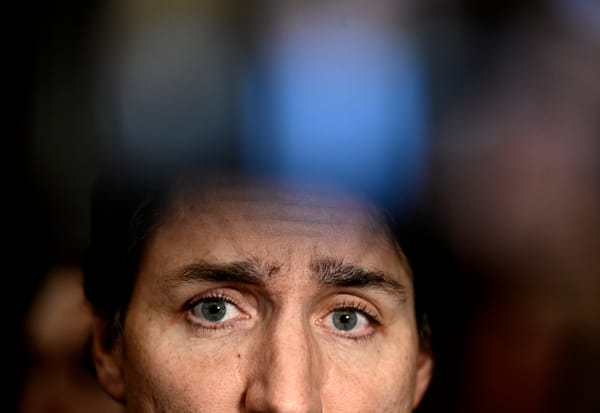At a Feb. 9 news conference, Justin Trudeau took aim at one of Canada’s largest media companies, Bell Media, which had recently announced it was laying off approximately 4,800 staffers. “This is the erosion of journalism,” declared the Canadian prime minister. He went on to blame the “corporate entities” that buy up news outlets only to worsen their quality, fire journalists, and shutter unprofitable outlets.
What passes for journalism in Canada has certainly eroded in recent years, but it is Trudeau himself who deserves much of the blame. In 2019, when executives from the same “corporate entities” he recently decried came to him and begged for taxpayer assistance to keep their unprofitable operations afloat, the prime minister lavished nearly $600 million upon them, followed by several “top-ups.” The effect has been to make Canada’s Fourth Estate a ward of the state, especially considering that, in addition to these handouts to nominally private broadcasters, our largest broadcaster, the CBC, is wholly government-owned and receives $1.3 billion a year in taxpayer funds.
Despite the government’s largesse, Canadians have continued losing trust in mainstream media outlets, and many have stopped paying for subscriptions, driving down revenue for their floundering operations. In terms of helping Trudeau’s political aims, however, the de-facto nationalization has been a great success. By combining de-facto ownership of major news outlets with new laws regulating media content—most recently, a bill proposed just this week targeting “hate speech”—the government has granted itself a remarkable degree of narrative control.
Both the extent and limits of that control were on view in the coverage of the latest developments in the so-called Coutts Four case. The Coutts Four, named for a small border community in Alberta that sits at the northern terminus of Interstate 15, were four men arrested in February 2022, on charges stemming from their involvement at a Freedom Convoy encampment at the border crossing.
These charges, which included the “conspiracy to murder police officers,” helped Trudeau to legitimize his invocation of the Emergencies Act, enabling the use of asset seizure and freezing of bank accounts of protesters and their supporters. As there was no violence to be found at any of the other protest sites, the allegations against the Coutts Four provided important cover for this unprecedented overreach.
On Feb. 6, it was announced that two of the Coutts Four, Jerry Morin and Chris Lysak, had accepted a plea deal. They were both sentenced to time served and released immediately. The implication of the deal, as criminal justice professor Doug King told CTV News Calgary, was that prosecutors “had some doubt that they would have been able to secure a conviction on the more serious charges.”
It was the first attention the Coutts case had received in some time. Ostensibly, this lack of coverage was owed to a ban on publishing certain information pertaining to the case, imposed at the request of the men’s defense counsel. The judge who agreed to the ban noted that amplifying “unsubstantiated allegations” against the men would reduce the pool of impartial jurors for a trial.
“Inconvenient questions about the case were suppressed.”
But the publication ban has come to serve as a pretext for media outlets not to report on details of the case that contradicted the narrative they had helped the government construct. In this way, inconvenient questions about the case could be suppressed.
Two of the accused men spent long periods in solitary confinement, a practice regarded by some authorities as torture. A decade ago, the Canadian media devoted considerable attention to the case of Omar Khadr, a Canada-born teenager who wound up fighting for the Taliban and was later held at Guantanamo; but reporters showed hardly any interest in why two men were subjected to Gitmo-like treatment in domestic prisons.
There is also the question of why these men, none of whom had violent criminal records, were denied bail. Might it have something to do with the fact that the judge who refused it, Johnna Kubik, is a member of and donor to Trudeau’s Liberal Party? We may add to that the fact that pretrial hearings for the case didn’t even begin until just after an inquest into Trudeau’s invocation of the Emergencies Act was complete. This was convenient timing, given that the allegations against the Coutts Four were cited in the ruling of that inquest as a legitimating factor for the invocation.
In the plea deal that saw Morin and Lysak released, the very serious charges of “conspiracy to murder police officers” were dropped, replaced by minor firearms-handling violations that weren’t part of the original suite of charges. If the state can accuse you of serious crimes, keep you locked up for two years, and then—when it appears the state is about to lose badly in court at a point when the case has lost its political utility, the charges are tossed—what right does anyone have to protest?
Pretrial hearings for the remaining two defendants resumed on Feb. 20, with applications made and witnesses cross-examined with regard to the legality of warrants being issued and then executed improperly. The defense alleges that both the Royal Canadian Mounted Police and the Crown engaged in “subversion” in order to convince the issuing judge to grant the warrant by manipulating “Information to Obtain” documents, raising the possibility that the men were set up in order to provide a pretext for the crackdown on the Freedom Convoy.
But you will barely hear a word about any of this from the Canadian media. By subordinating so much of it to the state, Trudeau has ensured that the official narrative remains largely unquestioned even after many of its details have failed to hold up under scrutiny. It is hardly surprising that major outlets continue to hemorrhage readers and viewers, forcing them to lay off staff, given how transparent their propaganda role has become.
Oh Canada, indeed.
Correction: Due to an editing error, an earlier version of this column used an incorrect title for Justin Trudeau.
